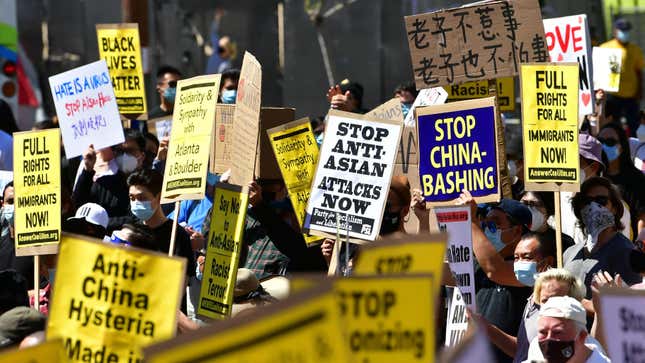
Last week, FirstEnergy, a powerful Midwest utility, tweeted a message of unity in the wake of increasing attacks on Asian American and Pacific Islander communities.
“FirstEnergy condemns the rise in violence across our country and stands in support of the Asian-American community,” read a statement with the accompanying hashtag #StopAsianHate. “We remain committed to standing against discrimination, injustice, and acts of violence against any race or ethnicity or any other targeted groups long after the headlines fade.”
It’s a nice corporate message, the type that has become almost routine in the wake of last summer’s Black Lives Matter protests. But what FirstEnergy didn’t mention in its tweet is that less than two years ago, it funded an incredibly racist ad campaign that claimed the Chinese government was trying to steal American jobs and personal information and infiltrate our energy grid.
The ad was part of a larger saga in Ohio that eventually embroiled State House Speaker Larry Householder in a $60 million bribery scheme to bail out FirstEnergy’s failing coal and nuclear plants in the state. FirstEnergy, federal authorities found, funded all efforts to eliminate Householder’s political opponents, elect sympathetic candidates, and pass legislation to save the struggling plants.
In 2019, opponents to the FirstEnergy bailout were rallying an effort to repeal the legislation, and began canvassing Ohioans to sign a petition to get the issue on the 2020 ballot. In response, the utility ran a campaign to scare the public off. The ads themselves say they were sponsored by a group called Ohioans for Energy Security, but there were some very clear links from the ads to the utility. Court documents later confirmed that FirstEnergy financed the campaign.
The ads are, in brief, completely bonkers and xenophobic. The front group chose to tell Ohioans that petition collectors were sent by the Chinese government, and that petitions were attempts to “control Ohio’s power.” (In case it’s not clear, that is patently false.)
“They took our manufacturing jobs. They shuttered our factories,” one spot opens. “Now, they’re coming for your energy jobs. The Chinese government is quietly invading our American electric grid.”
Much of the minute-long spot is stock clips from the Chinese parliamentary body—with the Communist Party’s hammer and sickle prominently displayed—and shots of lines of soldiers, overlaid over a sinister marching beat.
Though the group trying to get petitions received dark money and didn’t declare its donors, there’s currently no evidence it was afront for the Chinese government. (A similar campaign jumpstarted last year has ties to a Texas utility and the oil, gas, and wind industries.) Ohioans for Energy Security claimed that their descent into Sinophobia was justified because one of the opponents of the bill had gotten funding from a bank owned by the Chinese government—conveniently ignoring the fact that FirstEnergy itself got funding from that same bank.
The Ohioans for Energy Security front group’s website is still live; a slide on its homepage shows a closeup of gold stars on a red fabric background, ostensibly a nod to the Chinese flag. “CHINA IS QUIETLY INVADING OUR ENERGY GRID AND COMING FOR OUR OHIO JOBS,” text on the banner screams. It even attributes the petition to the Chinese government, imploring Ohioans to not “give the Chinese government your personal information, email, cell phone, address or sign their petition;” they sent mailers mimicking the site’s design all over Ohio. The opposition group said that the aggressive campaign was why they couldn’t put together enough signatures on the petition to get the issue on the 2020 ballot.
“Of course some people are being told [to] go home from where you came from,” Kaz Sato of the Cincinnati Chapter of the Japanese American Citizens League told a local news station in 2019, when the ads were making the rounds on local television. “We are all Americans and we should work for the future. If you attack each other, that’s not going to work.”
According to Dave Anderson of the Energy and Policy Institute, who first drew the line between FirstEnergy’s #StopAsianHate tweet and the racist campaign, the utility has never publicly apologized to the AAPI community. A spokesperson for FirstEnergy told the Ohio Capital Journal that the company is under “new leadership” since 2019, which is “fully committed to diversity and inclusion and condemning violence and discrimination against Asian Americans.”
That FirstEnergy thought it would be kosher to send out a tweet saying they “remain committed” to antiracism less than two years after it funded that ad campaign is truly something. The image of China as a political bogeyman is all over American politics, which has the effect of mushing together real criticisms of policy and governance with various degrees of scaremongering. But hateful campaigns like FirstEnergy’s and racist rhetoric have real life consequences. Data shows that Trump’s tweets about coronavirus coming from China led to a rise in anti-Asian sentiment online.
The U.S.-China energy relationship—and what China represents to the world as it scrambles to meet the goals of the Paris Agreement—is a complex one, and with good reason. As two of the world’s biggest emitters, what these countries do matter, and a good working relationship is going to be crucial to keeping our emissions down moving forward. And this is not to say that China is not deserving of scrutiny as a political actor (far from it). But just because Joe Biden doesn’t refer to covid-19 as the “kung flu” like the previous president doesn’t mean that his “tough on China” stance can’t also encourage xenophobia and racism.
FirstEnergy is a powerful utility, which spends millions each year on federal lobbying in DC; they knew what they were doing when they created those ad campaigns, and should be held accountable. But as long as we’re keeping China as a bogeyman to use when it’s convenient for our political arguments, it’s a slippery slope to campaigns like FirstEnergy’s—and no amount of corporate apologies will be enough to right the ship.